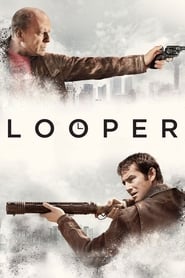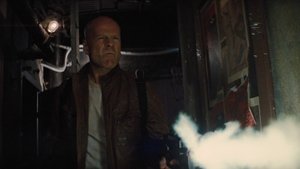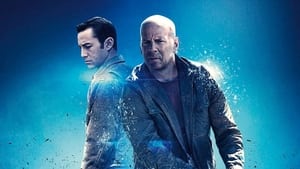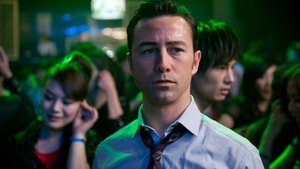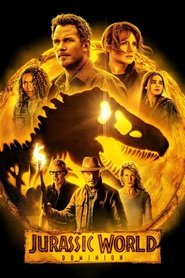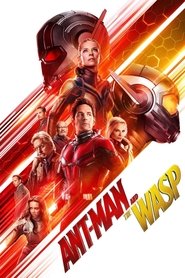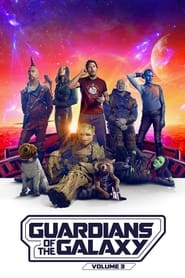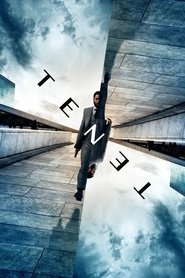It's impossible to believe that it's been seven years since director Rian Johnson and a young budding star named Joseph Gordon-Levitt teamed up for the tightly drawn high school noir flick Brick. As a first time writer and director on a major motion picture, Brick introduced us to the creative possibilities of the obviously talented Rian Johnson. Over half a decade later, the tag team of Johnson and Gordon-Levitt have gone and raised the bar even higher with their newly released sci-fi action thriller, Looper.
In 2044 time traveled hasn't been invented yet, but in 30 years from then, it will be. And although time travel quickly becomes outlawed in the future, crime organizations still find a way to send their targets back in time to have them eliminated by Loopers like Joe (played by Gordon-Levitt). Loopers are paid very well and live a glorious life in a rather desolate futuristic world. But there's one major rule for Loopers though, never let your target escape. Joe's been a loyal assassin and followed the golden rule his entire career, until the day he discovers that his target is his future self (played by Willis).

Rian Johnson's third directorial effort, Looper, is a meticulously crafted and beautifully original sci-fi adventure that proves there's still plenty of creativity floating around Hollywood. As both the writer and director on the film, Johnson conjures up one of the most believable futuristic worlds in sci-fi history. He welcomes us to a 2044 familiar enough to keep the experience authentic, but different enough to serve as an appropriate platform for the story. Perhaps the most impressive aspect of Looper is Johnson's unparalleled ability to constantly progress the film's plot. By continually planting the most subtle of seeds throughout the movie, Johnson gives his masterpiece the open-ended potential to go just about anywhere ... which he does. The writer/director clearly had visions of grandeur when he began tackling the concept of Looper. Attempting to address a complex scientific notion such as time travel requires detailed precision and some extremely ambitious ideas. But rather than devoting its entirety to explain time travel, the phenomena merely serves as a backdrop to a much larger and more important examination of the feature's main characters. Clearly Johnson can rest assured knowing that Looper hurdles over every obstacle on its path to becoming an instant sci-fi classic. Thanks, in large part, to an imaginative and taut script that leaves almost no loose ends, Looper manages to finds itself among the most memorable films of 2012.

For as excellent and clever as the story is, Looper still lands short of perfection. One obvious flaw lies in the surprising amount of screen time given to Noah Segan's character Kid Blue. Overused and unimpressive, Segan finds himself dominating screen time all while the audience waits patiently for the film to progress. More so a complaint about the character than Segan's individual performance, Looper would have been better served without the inclination to give so much attention to such a pointless character. And for as much of a Joseph Gordon-Levitt fan as I am, he and Willis both demonstrate that they're not quite at the level of some of Hollywood's greats. While the pair's performances are by no means detracting from the film, there are a few occasional moments where they leave a little to be desired. However, these minor blemishes aren't nearly enough to call into questions the apparent success of Looper.
Rarely are we handed an epic sci-fi journey with as much originality and ingenuity as Rian Johnson's Looper. Massively entertaining from start to finish, Looper's success hinges on its innovative script and many of its strong supporting cast members such as Emily Blunt and Jeff Daniels. But perhaps the most extraordinary aspect of the film resides in its final moments. With a hair-rising finale that's sure to impress, Looper concludes in grand fashion.
-
 NameJoseph Gordon-LevittCharacterJoe
NameJoseph Gordon-LevittCharacterJoe -
 NameBruce WillisCharacterOld Joe
NameBruce WillisCharacterOld Joe -
 NameEmily BluntCharacterSara
NameEmily BluntCharacterSara -
 NamePaul DanoCharacterSeth
NamePaul DanoCharacterSeth -
 NameNoah SeganCharacterKid Blue
NameNoah SeganCharacterKid Blue -
 NamePiper PeraboCharacterSuzie
NamePiper PeraboCharacterSuzie -
 NameJeff DanielsCharacterAbe
NameJeff DanielsCharacterAbe -
 NamePierce GagnonCharacterCid
NamePierce GagnonCharacterCid -
 NameXu QingCharacterOld Joe's Wife
NameXu QingCharacterOld Joe's Wife -
 NameTracie ThomsCharacterBeatrix
NameTracie ThomsCharacterBeatrix -
 NameFrank BrennanCharacterOld Seth
NameFrank BrennanCharacterOld Seth -
 NameGarret DillahuntCharacterJesse
NameGarret DillahuntCharacterJesse -
 NameNick GomezCharacterDale
NameNick GomezCharacterDale -
 NameMarcus HesterCharacterZach
NameMarcus HesterCharacterZach -
 NameJon EyezCharacterGat Man
NameJon EyezCharacterGat Man -
 NameKevin StillwellCharacterGat Man
NameKevin StillwellCharacterGat Man -
 NameThirl HastonCharacterGat Man
NameThirl HastonCharacterGat Man -
 NameJames Landry HébertCharacterLooper
NameJames Landry HébertCharacterLooper -
 NameKenneth Brown Jr.CharacterLooper
NameKenneth Brown Jr.CharacterLooper -
 NameCody WoodCharacterLooper
NameCody WoodCharacterLooper -
 NameAdam BoyerCharacterTye
NameAdam BoyerCharacterTye -
 NameJeff ChaseCharacterTall Gat Man
NameJeff ChaseCharacterTall Gat Man -
 NameRitchie MontgomeryCharacterBodega Owner
NameRitchie MontgomeryCharacterBodega Owner -
 NameDavid JensenCharacterApt Super
NameDavid JensenCharacterApt Super -
 NameKamden BeauchampCharacterDaniel
NameKamden BeauchampCharacterDaniel -
 NameJosh PerryCharacterFarm Vagrant
NameJosh PerryCharacterFarm Vagrant -
 NameDavid Joseph MartinezCharacterOld Dale
NameDavid Joseph MartinezCharacterOld Dale -
 NameWayne DehartCharacterSeth Vagrant
NameWayne DehartCharacterSeth Vagrant -
 NameIan PatrickCharacterBeggar Kid
NameIan PatrickCharacterBeggar Kid -
 NameCraig JohnsonCharacterBig Craig
NameCraig JohnsonCharacterBig Craig -
 NameRobert HarveyCharacterParking Attendant
NameRobert HarveyCharacterParking Attendant -
 NameSylvia JefferiesCharacterNeighbor Girl (uncredited)
NameSylvia JefferiesCharacterNeighbor Girl (uncredited) -
 NameLauren AlexandraCharacterWaitress (uncredited)
NameLauren AlexandraCharacterWaitress (uncredited) -
 NameD.J. MillsCharacterCold Homeless Boy (uncredited)
NameD.J. MillsCharacterCold Homeless Boy (uncredited) -
 NameBrea GrantCharacterTK Billboard Girl (uncredited)
NameBrea GrantCharacterTK Billboard Girl (uncredited) -
 NameSam MedinaCharacterChinese Thug (uncredited)
NameSam MedinaCharacterChinese Thug (uncredited) -
 NameRhonda Floyd AguillardCharacterVagrant (uncredited)
NameRhonda Floyd AguillardCharacterVagrant (uncredited) -
 NameJay AmorCharacterGatman (uncredited)
NameJay AmorCharacterGatman (uncredited) -
 NameAmy LeCharacterChinese Waitress (uncredited)
NameAmy LeCharacterChinese Waitress (uncredited) -
 NameWayne Douglas MorganCharacterBouncer (uncredited)
NameWayne Douglas MorganCharacterBouncer (uncredited) -
 NameKristyl Dawn TiftCharacterMadame (uncredited)
NameKristyl Dawn TiftCharacterMadame (uncredited) -
 NameDallas WestCharacterExtra (uncredited)
NameDallas WestCharacterExtra (uncredited)
-
 NameRian JohnsonJobDirector
NameRian JohnsonJobDirector -
 NameNathan JohnsonJobOriginal Music Composer
NameNathan JohnsonJobOriginal Music Composer -
 NameRian JohnsonJobWriter
NameRian JohnsonJobWriter -
 NameSteve YedlinJobDirector of Photography
NameSteve YedlinJobDirector of Photography -
 NameBob DucsayJobEditor
NameBob DucsayJobEditor -
 NameRam BergmanJobProducer
NameRam BergmanJobProducer -
 NameJames D. SternJobProducer
NameJames D. SternJobProducer -
 NameJulie GoldsteinJobExecutive Producer
NameJulie GoldsteinJobExecutive Producer -
 NameJoseph Gordon-LevittJobExecutive Producer
NameJoseph Gordon-LevittJobExecutive Producer -
 NameDouglas HansenJobExecutive Producer
NameDouglas HansenJobExecutive Producer -
 NamePeter SchlesselJobExecutive Producer
NamePeter SchlesselJobExecutive Producer -
 NameLindsay Graham AhanonuJobCasting
NameLindsay Graham AhanonuJobCasting -
 NameMary VernieuJobCasting
NameMary VernieuJobCasting -
 NameEd VerreauxJobProduction Design
NameEd VerreauxJobProduction Design -
 NameSharen DavisJobCostume Design
NameSharen DavisJobCostume Design -
 NameGreg UddoJobExtras Casting Assistant
NameGreg UddoJobExtras Casting Assistant -
 NameWendy TalazacJobExtras Casting
NameWendy TalazacJobExtras Casting -
 NameBrandon HemmerlingJobCasting Associate
NameBrandon HemmerlingJobCasting Associate -
 NameLisa Mae FincannonJobLocation Casting
NameLisa Mae FincannonJobLocation Casting -
 NameCraig FincannonJobLocation Casting
NameCraig FincannonJobLocation Casting -
 NameTara Feldstein BennettJobCasting Associate
NameTara Feldstein BennettJobCasting Associate -
 NameAshley CarmichaelJobCasting Assistant
NameAshley CarmichaelJobCasting Assistant -
 NameJohn ZimmermanJobStunts
NameJohn ZimmermanJobStunts -
 NameStuart F. WilsonJobStunt Double
NameStuart F. WilsonJobStunt Double -
 NameMike WilsonJobStunts
NameMike WilsonJobStunts -
 NameJoe Nin WilliamsJobStunts
NameJoe Nin WilliamsJobStunts -
 NameTony VoJobStunts
NameTony VoJobStunts -
 NameEric VanArsdaleJobStunts
NameEric VanArsdaleJobStunts -
 NameMatthew R. StaleyJobStunts
NameMatthew R. StaleyJobStunts -
 NameGreg SprolesJobStunts
NameGreg SprolesJobStunts -
 NameHan SotoJobStunts
NameHan SotoJobStunts -
 NameTom SicolaJobStunts
NameTom SicolaJobStunts -
 NameWilliam ScharpfJobStunts
NameWilliam ScharpfJobStunts -
 NameBruce Sanders Jr.JobStunts
NameBruce Sanders Jr.JobStunts -
 NameElena SanchezJobStunts
NameElena SanchezJobStunts -
 NameElena SanchezJobStunt Double
NameElena SanchezJobStunt Double -
 NameEric SalasJobStunts
NameEric SalasJobStunts -
 NameRoss Morgan RubenJobStunts
NameRoss Morgan RubenJobStunts -
 NameAlec RaymeJobStunts
NameAlec RaymeJobStunts -
 NameTom ProctorJobStunts
NameTom ProctorJobStunts -
 NameChuck Picerni Jr.JobUtility Stunts
NameChuck Picerni Jr.JobUtility Stunts -
 NameBrian OerlyJobStunts
NameBrian OerlyJobStunts -
 NameBrian NguyenJobStunts
NameBrian NguyenJobStunts -
 NameSam MedinaJobStunts
NameSam MedinaJobStunts -
 NameMike MayhallJobStunts
NameMike MayhallJobStunts -
 NameEddie MatthewsJobStunts
NameEddie MatthewsJobStunts -
 NameJunwei LiuJobStunts
NameJunwei LiuJobStunts -
 NamePok Yan LeungJobStunts
NamePok Yan LeungJobStunts -
 NameRose LeikerJobStunts
NameRose LeikerJobStunts -
 NameAmy LeeJobStunts
NameAmy LeeJobStunts -
 NameAmy LeJobStunts
NameAmy LeJobStunts -
 NameDion LamJobStunts
NameDion LamJobStunts -
 NameThirl HastonJobStunts
NameThirl HastonJobStunts -
 NameRegis HarringtonJobStunts
NameRegis HarringtonJobStunts -
 NameShaun GrantJobStunts
NameShaun GrantJobStunts -
 NameAdam GomezJobStunts
NameAdam GomezJobStunts -
 NameLex D. GeddingsJobStunt Coordinator
NameLex D. GeddingsJobStunt Coordinator -
 NameChristian J. FletcherJobStunts
NameChristian J. FletcherJobStunts -
 NameTrace CheramieJobStunts
NameTrace CheramieJobStunts -
 NameAndy ChengJobStunts
NameAndy ChengJobStunts -
 NameChris BryantJobStunts
NameChris BryantJobStunts -
 NameJeff BrocktonJobStunts
NameJeff BrocktonJobStunts -
 NameEmily BrobstJobStunts
NameEmily BrobstJobStunts -
 NameSean Paul BraudJobStunts
NameSean Paul BraudJobStunts -
 NameJohn BerneckerJobStunts
NameJohn BerneckerJobStunts -
 NameTim BellJobStunts
NameTim BellJobStunts -
 NameHunter BaxleyJobStunts
NameHunter BaxleyJobStunts -
 NameStanton BarrettJobStunts
NameStanton BarrettJobStunts -
 NameJay AmorJobStunts
NameJay AmorJobStunts -
 NameTom AkosJobStunts
NameTom AkosJobStunts -
 NameAndy AbeleJobStunts
NameAndy AbeleJobStunts -
 NameJames A. GelardenJobArt Direction
NameJames A. GelardenJobArt Direction -
 NameScott PlaucheJobArt Direction
NameScott PlaucheJobArt Direction -
 NameKatherine VerreauxJobSet Decoration
NameKatherine VerreauxJobSet Decoration -
 NameMelizah Anguiano WheatJobHairstylist
NameMelizah Anguiano WheatJobHairstylist -
 NameTony WardJobHairstylist
NameTony WardJobHairstylist -
 NameStacy KellyJobMakeup Department Head
NameStacy KellyJobMakeup Department Head -
 NameNikki I BrownJobMakeup Artist
NameNikki I BrownJobMakeup Artist -
 NameKristin LekkiJobArt Department Coordinator
NameKristin LekkiJobArt Department Coordinator -
 NameDale MyrandJobCamera Operator
NameDale MyrandJobCamera Operator -
 NameAlan MarkfieldJobStill Photographer
NameAlan MarkfieldJobStill Photographer -
 NameDana Kay HartJobCostume Supervisor
NameDana Kay HartJobCostume Supervisor -
 NameYvonne BastidosJobSet Costumer
NameYvonne BastidosJobSet Costumer -
 NameLeoisick CastroJobSet Costumer
NameLeoisick CastroJobSet Costumer -
 NameSam SullivanJobScript Supervisor
NameSam SullivanJobScript Supervisor -
 NameJohn HoulihanJobMusic Supervisor
NameJohn HoulihanJobMusic Supervisor -
 NameDrew DeAscentisJobMusic Editor
NameDrew DeAscentisJobMusic Editor -
 NameChristopher C. ChenJobCo-Producer
NameChristopher C. ChenJobCo-Producer -
 NameLucas SmithJobCo-Producer
NameLucas SmithJobCo-Producer -
 NameEleanor NettJobCo-Producer
NameEleanor NettJobCo-Producer -
 NameKaren E. GoulekasJobVisual Effects Supervisor
NameKaren E. GoulekasJobVisual Effects Supervisor -
 NameSteven RitziJobStunt Coordinator
NameSteven RitziJobStunt Coordinator -
 NameJoseph KirklandJobFirst Assistant Editor
NameJoseph KirklandJobFirst Assistant Editor -
 NameDavid PomierJobUnit Production Manager
NameDavid PomierJobUnit Production Manager -
 NameDavid PomierJobCo-Producer
NameDavid PomierJobCo-Producer -
 NameMark Edward WrightJobVisual Effects Editor
NameMark Edward WrightJobVisual Effects Editor -
 NameRyan LottJobOther
NameRyan LottJobOther -
 NameDan MintzJobExecutive Producer
NameDan MintzJobExecutive Producer -
 NameKazu HiroJobProsthetic Designer
NameKazu HiroJobProsthetic Designer -
 NameJaron PresantJobSecond Unit Director of Photography
NameJaron PresantJobSecond Unit Director of Photography -
 NameAndrew FrancisJobColorist
NameAndrew FrancisJobColorist -
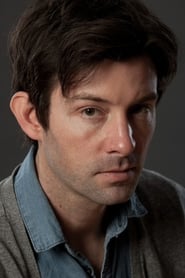 NameShane CarruthJobThanks
NameShane CarruthJobThanks -
 NameRay McIntyre Jr.JobVisual Effects Supervisor
NameRay McIntyre Jr.JobVisual Effects Supervisor -
 NameRyan TudhopeJobVisual Effects Supervisor
NameRyan TudhopeJobVisual Effects Supervisor


